Roses are beloved for their stunning blooms, fragrance, and symbolic beauty, but cultivating them can sometimes feel like a battle against pests. Among the many insects that visit rose bushes, ants are perhaps the most misunderstood. Gardeners often spot ants crawling along stems and buds and immediately worry they might harm the plants. Yet, experts say the relationship between ants and roses is more complex than it seems.
This guide explores the question: Do ants really help roses? We’ll look at the science behind their behavior, the pros and cons of having ants on your rose bushes, and expert advice on managing their presence for healthier plants.
Understanding Ant Behavior on Roses
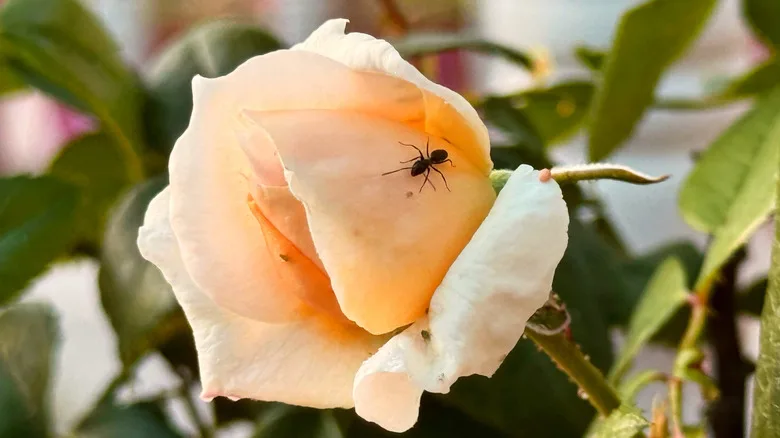
Ants are social insects that live in colonies and are constantly on the lookout for food sources, such as nectar, sap, or small insects. When it comes to roses:
- They are attracted to nectar: Roses produce nectar at the base of flower buds and sometimes on young stems.
- They farm aphids: Ants “herd” aphids to feed on their honeydew, a sugary substance produced by the aphids.
- They defend their territory: Ants can chase away some herbivorous insects that might harm plants.
While ants themselves do not bite rose petals or leaves, their presence can indirectly affect the plant—sometimes positively, sometimes negatively.
Pro Tip: Observing ants on your roses can help you determine whether they are beneficial visitors or partners in pest problems.
How Ants Can Help Roses
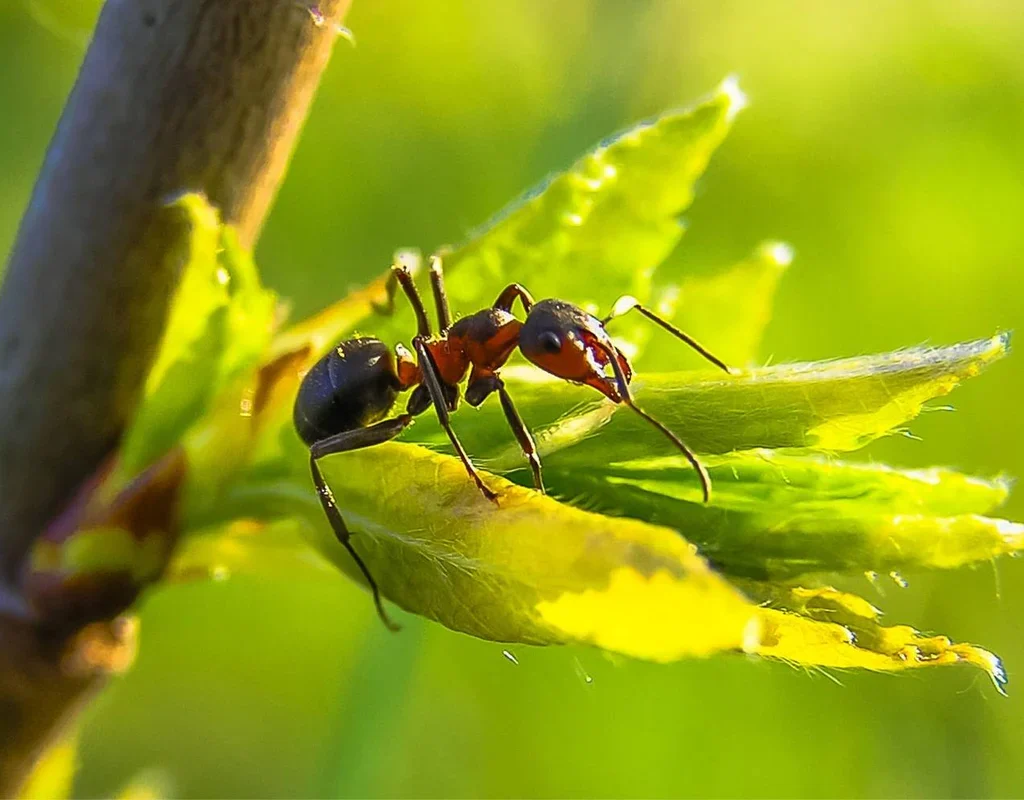
1. Protection from Herbivorous Insects
Some ants act as bodyguards for roses by attacking or deterring other insects, such as caterpillars or beetles, that might feed on leaves and flowers. In this sense, ants can contribute to natural pest control, reducing the need for chemical insecticides.
2. Soil Aeration
While not specific to roses, ants tunnel through the soil, which can improve drainage and aeration. Well-aerated soil allows rose roots to absorb nutrients and water more effectively, indirectly promoting healthy growth.
3. Pollination Assistance (Indirect)
Although ants are not major pollinators for roses, their movement around flower buds can sometimes help transfer pollen in small amounts. More importantly, their presence attracts other insects that may actively pollinate your roses.
Pro Tip: Having a moderate number of ants is not necessarily harmful and can even support a small ecosystem around your rose bushes.
How Ants Can Harm Roses
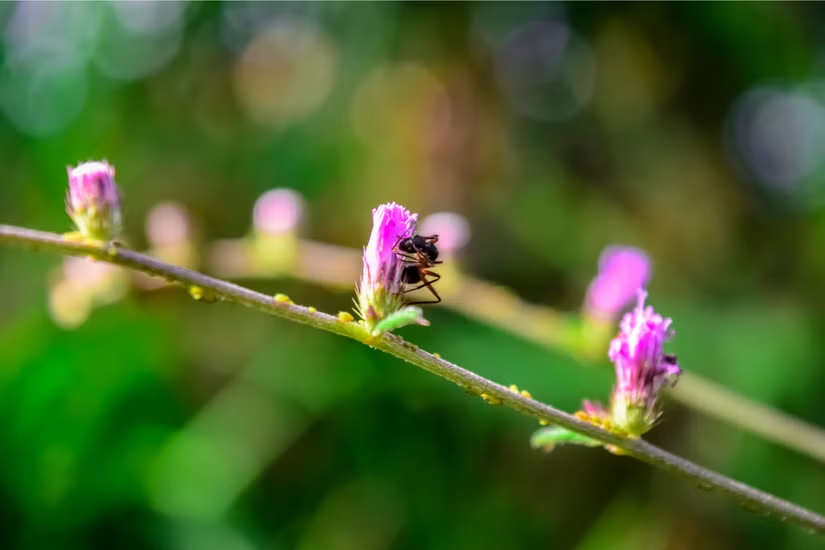
Despite their potential benefits, ants are often associated with negative effects, primarily due to their relationship with aphids and scale insects.
1. Aphid Farming
Ants “farm” aphids for honeydew, protecting them from predators like ladybugs. Aphids, in turn, feed on rose sap, weakening plants, distorting leaves, and spreading viruses. If aphid populations rise unchecked, ants become indirect pests, making the rose suffer.
2. Encouraging Scale Insects and Mealybugs
Similar to aphids, scale insects produce honeydew that ants collect. By protecting these pests, ants can allow infestations to grow, which may reduce flower production and plant vigor.
3. Nesting in the Soil
Large ant colonies near the base of rose bushes can sometimes disturb roots. While moderate soil aeration is helpful, overly extensive tunneling can damage young or shallow roots, especially in newly planted roses.
Pro Tip: The presence of ants is often a symptom, not the root cause. If ants are abundant, check for aphids or other pests feeding on your roses.
Expert Advice on Managing Ants on Roses
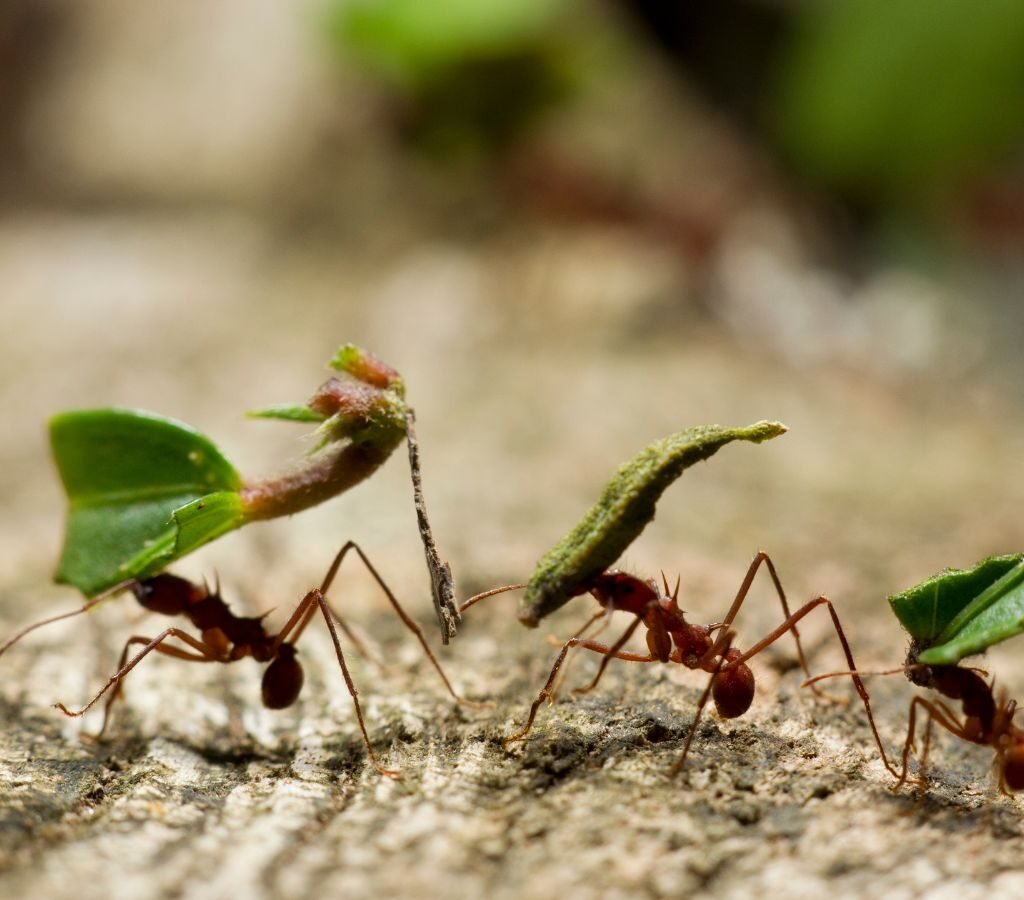
1. Monitor Before Intervening
Experts advise observing ant activity before taking action. If ants are present but aphid populations are low, they may be providing a net benefit.
2. Control Aphids Naturally
If aphids are present:
- Introduce natural predators like ladybugs or lacewings.
- Spray with insecticidal soap or a mild neem oil solution.
- Remove heavily infested leaves to prevent further spread.
By controlling aphids, ants lose their food source, which can naturally reduce ant activity around rose buds.
3. Use Physical Barriers
To keep ants off flower buds:
- Apply Tanglefoot or sticky barriers around stems.
- Wrap aluminum foil or horticultural tape at the base of stems.
- Plant repellent flowers like marigolds nearby to discourage ants.
Pro Tip: Barriers should be monitored and reapplied as needed to maintain effectiveness.
4. Avoid Harmful Pesticides
Spraying broad-spectrum pesticides can kill beneficial insects like pollinators and predatory insects that naturally control aphids. Experts recommend targeted, eco-friendly approaches over chemical sprays.
5. Encourage a Balanced Garden Ecosystem
Planting diverse companion flowers and herbs around roses attracts beneficial insects that prey on aphids and other pests, helping keep ant populations in check naturally.
Companion Plants to Reduce Ant Problems
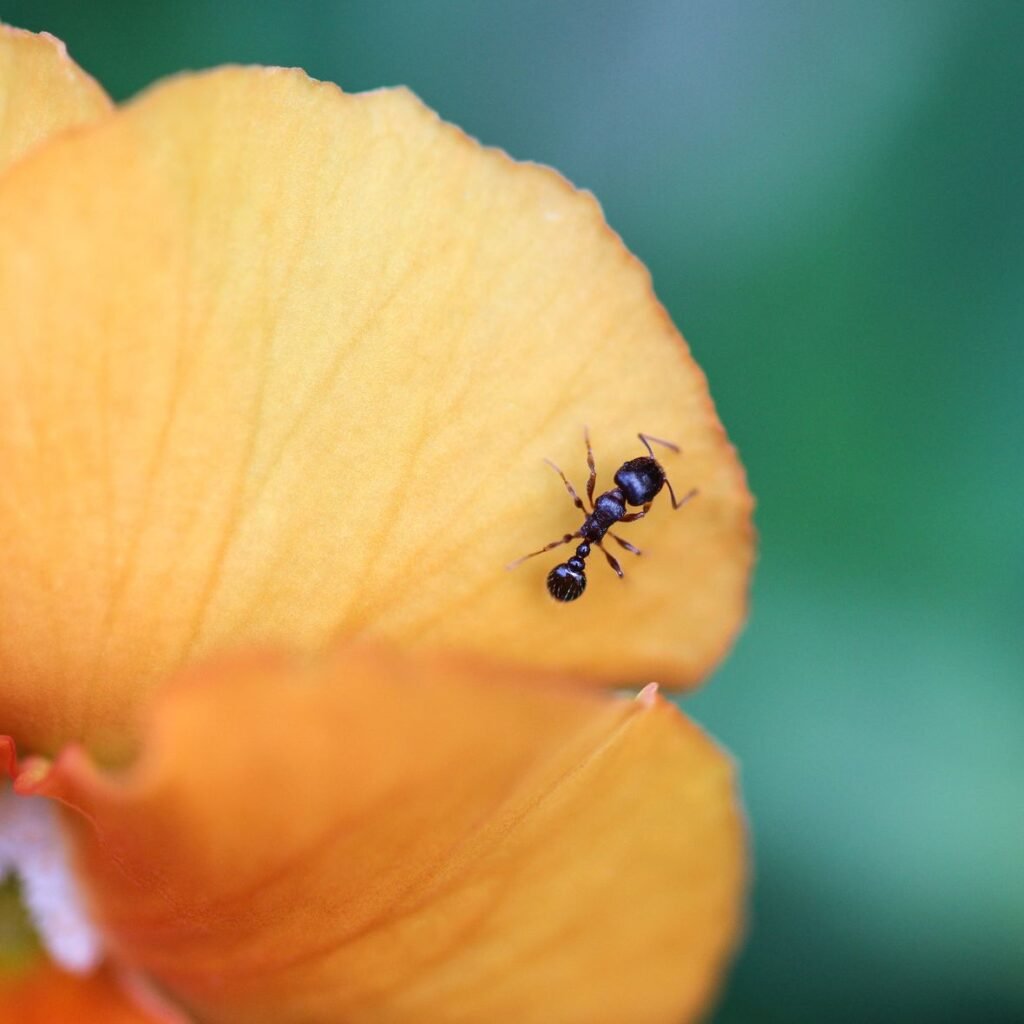
- Marigolds: Repel aphids and attract ladybugs.
- Lavender: Strong fragrance deters many insects, including ants.
- Chives and garlic: Help reduce aphid populations near roses.
- Nasturtiums: Act as trap crops for aphids, keeping ants occupied away from roses.
Pro Tip: Companion planting not only protects roses but also enhances garden color, fragrance, and biodiversity.
Common Myths About Ants on Roses
- Myth: “Ants are eating my roses.”
Fact: Ants rarely feed on rose petals or leaves; they are attracted to nectar and aphids. - Myth: “All ants are bad for roses.”
Fact: Moderate ant activity can benefit roses indirectly by controlling pests and aerating soil. - Myth: “Killing ants will protect roses.”
Fact: Eliminating ants without addressing aphids may not solve the problem and can disrupt natural predator-prey balance in your garden.
When Ants Become a Problem
Ants should be managed if:
- Aphid populations are high and uncontrolled.
- Scale insects or mealybugs are abundant.
- Large colonies are disturbing rose roots.
In these cases, targeted interventions—like natural predators, sticky barriers, or careful pruning—can control ants without harming your roses.
Expert Tips for Healthy Roses
- Regular inspection: Check buds, stems, and leaves weekly for aphids or other pests.
- Maintain plant vigor: Healthy roses are more resistant to pest damage.
- Encourage biodiversity: A mix of flowers, herbs, and companion plants supports natural pest control.
- Water and mulch correctly: Proper irrigation and mulch reduce stress, making roses less attractive to pests.
- Prune thoughtfully: Removing dead or crowded branches reduces aphid habitat and improves airflow.
Final Thoughts
So, do ants really help roses? The answer is nuanced. Ants themselves do not harm rose flowers, and they can indirectly benefit plants by:
- Protecting against certain herbivores
- Improving soil aeration
- Supporting minor pollination activity
However, when ants farm aphids or other pests, they can become indirect threats to rose health. The key is observation and balance. By managing aphid populations, using natural barriers, encouraging beneficial insects, and planting companion plants, gardeners can enjoy the benefits of ants while minimizing their negative effects.
With expert strategies in place, your rose garden can thrive, bloom beautifully, and maintain ecological balance, letting you appreciate the elegance of roses without the frustration of ant-related issues.
Pro Tip: Embrace ants as part of a healthy garden ecosystem, but intervene wisely when their activities threaten your roses.

Leave A Comment